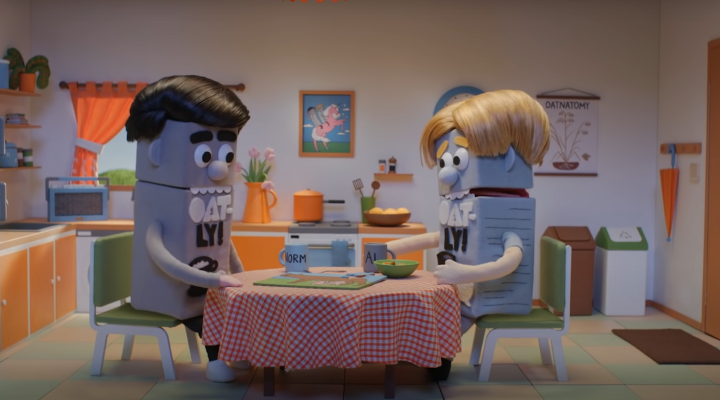This week, oat milk brand Oatly is launching a campaign across Australia in an effort to start a conversation about how it’s normal to eat a plant-based or flexitarian diet. Always a brand pushing its marketing into interesting places, Oatly is doing this through an online tv show called ‘The New Norm&al Show’. The show features two puppets (the titular Norm & Al) discussing the shift from a meat-based diet to one intentionally incorporating more plant-based options. Acco
.
According to Oatly’s creative director Michael Lee, the new show will help the brand deliver a message that some people “may roll their eyes at, but won’t, because, well, who doesn’t like puppets?”
“After trying to help people eat more plant-based [food] with super long Instagram posts, a dorky AFL Grand Final ad, and nonsensical headlines, we’ve now landed on puppets to do the job,” Lee said.
And while the show itself can only be seen online through YouTube or Oatly’s website, a partnership with Woolworths will see Norm and Al recommending the joys of flexitarian eating across almost all of the supermarket’s stores in Australia.
The Oatly Department of Mind Control
Oatly has been making oat milk for around 30 years, but underwent a significant rebranding process when chief executive Tony Peterson was hired in 2012 to revamp the business .
Last week, chief creative officer John Schoolcraft talked at Marketing Pulse Asia about how Oatly has turned into a brand lauded for its unique voice and marketing.
According to Schoolcraft, it all started when he cut out the business’ marketing department, redirected staff that had been creating the brand’s advertising to different departments, and replaced it with the ‘Department of Mind Control’.
“[When Tony offered me the job], I had a very selfish request, I asked ‘can I kill the marketing department?’” Schoolcraft said.
“I’m a creative and I’d always thought marketing directors had ruined some of my best work, so I thought it would be a little bit of payback.”
Peterson agreed, and the company’s marketing began being designed through a more creative lens, without thought for the advertising ramifications of any choices made.
Oatly’s famous tagline, ‘It’s like milk, but made for humans’, came out of this process, as well as its 2021 Super Bowl ad which saw the company’s CEO singing ‘wow, no cow,’ in a field to protest a lawsuit from a collective of Swedish milk companies.
“We ran that as an anti-commercial in the Super Bowl, and we stuck that line everywhere we could because we didn’t want to be bullied by the Swedish milk industry,” Schoolcraft said.
“It was a total David and Goliath situation, and we became famous overnight. [In 2012] we were a US$20 million company, and today we’re worth over US$600 million.”
According to Schoolcraft, Oatly doesn’t do brand awareness surveys, target group analyses, presentation rounds, or anything that will hold up the creative team from creating.
Instead, they are empowered to get the brand’s message across in new and interesting ways.
This is possible because the business employs a flat hierarchical structure, which allows players from all departments to be in meetings together, and always on the same page.
“A lot of the things that we do are too risky, too complicated or too time consuming, there’s little focus on driving sales, and it’s too inconsistent to track,” Schoolcraft said.
“But, it also makes us impossible to copy.”
The key message is the same: Oatly helps people make healthy choices about what they eat and drink which are good for them and the planet.
All around the globe, Oatly’s mission and voice are consistent, regardless of the customer base or region.
“We don’t really think of Oatly as a brand, we think of it as a voice, and we don’t change that voice depending on where we are,” Schoolcraft said.

